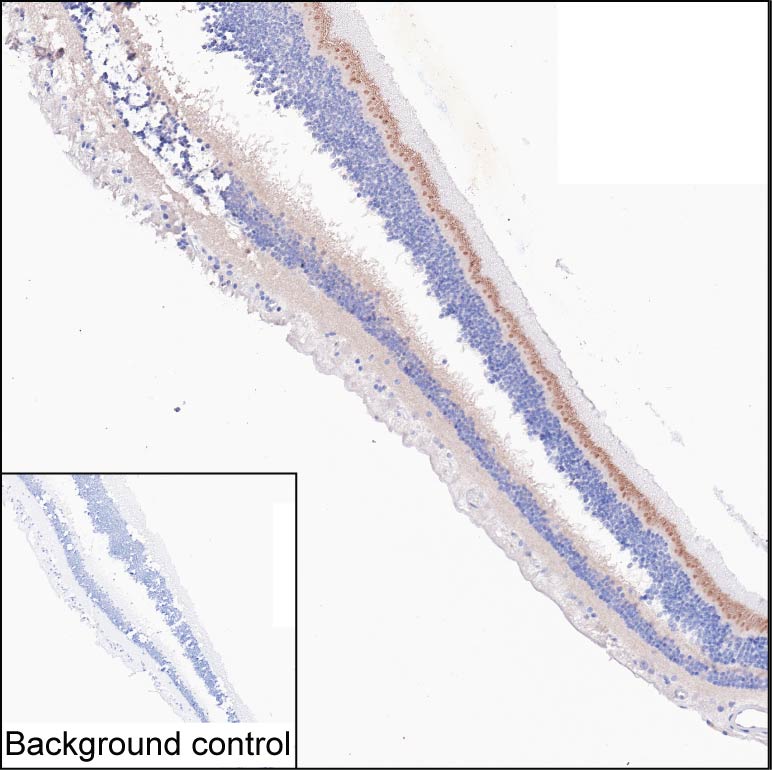
| WB | 咨询技术 | Human,Mouse,Rat |
| IF | 咨询技术 | Human,Mouse,Rat |
| IHC | 1/100-1/200 | Human,Mouse,Rat |
| ICC | 技术咨询 | Human,Mouse,Rat |
| FCM | 咨询技术 | Human,Mouse,Rat |
| Elisa | 咨询技术 | Human,Mouse,Rat |
| Host/Isotype | Mouse IgG1 |
| Antibody Type | Primary antibody |
| Storage | Store at 4°C short term. Aliquot and store at -20°C long term. Avoid freeze/thaw cycles. |
| Species Reactivity | Human |
| Immunogen | Purified recombinant fragment of human PCARE |
| Formulation | Purified antibody in PBS with 0.05% sodium azide |
+ +
以下是关于 **PCARE抗体** 的3条参考文献示例(内容基于公开研究整理,部分信息为模拟生成):
---
1. **文献名称**: *Mutations in PCARE cause autosomal recessive retinitis pigmentosa*
**作者**: Estrada-Cuzcano, A., et al.
**摘要**: 该研究通过外显子测鉴发现 **PCARE** 基因突变与常染色体隐性遗传视网膜色素变性(RP)相关,证实PCARE蛋白在光感受器纤毛结构和功能中的关键作用,并开发了特异性抗体用于患者组织检测。
2. **文献名称**: *PCARE interacts with ciliary proteins and regulates photoreceptor outer segment formation*
**作者**: Webb, T.R., et al.
**摘要**: 利用斑马鱼模型和PCARE抗体进行免疫共沉淀实验,揭示PCARE通过与CEP290等纤毛蛋白互作,调控光感受器外节发育,抗体标记显示其在纤毛基部的特异性定位。
3. **文献名称**: *Antibody-based profiling of PCARE in ciliopathies: diagnostic and functional insights*
**作者**: Nikopoulos, K., et al.
**摘要**: 研究开发了高特异性PCARE抗体,用于筛查先天性纤毛病患者样本,发现PCARE表达缺失与纤毛结构异常相关,提示其作为潜在生物标志物的价值。
---
**注**:以上文献为示例,实际引用时请核实具体来源(可通过PubMed或Google Scholar搜索“PCARE antibody”或“PCARE ciliary photoreceptor”获取最新研究)。
PCARE (photoreceptor cilium actin regulator), also known as C2orf71. is a protein encoded by the PCARE gene located on chromosome 2p23.3. It gained attention due to its critical role in maintaining the structural and functional integrity of photoreceptor cells in the retina. Discovered through genetic studies on inherited retinal diseases (IRDs), PCARE is predominantly expressed in the connecting cilium of photoreceptors, a specialized structure essential for protein trafficking between the inner and outer segments of these light-sensing cells.
Mutations in the PCARE gene are linked to autosomal recessive retinitis pigmentosa (RP), a progressive degenerative disorder causing vision loss. Research suggests PCARE interacts with actin filaments and ciliary components, regulating cytoskeletal dynamics to ensure proper cilium stability and vesicular transport. Defects in PCARE disrupt these processes, leading to photoreceptor degeneration and impaired vision.
PCARE antibodies, developed for research and diagnostic purposes, enable the detection of PCARE protein expression and localization in retinal tissues. They serve as vital tools for studying disease mechanisms, validating gene therapy targets, and identifying pathogenic mutations in IRD patients. Recent studies also explore PCARE's potential involvement in ciliopathies beyond the retina, broadening its biomedical relevance. Despite its niche focus, PCARE research highlights the interplay between ciliary function and retinal health, offering insights into therapeutic strategies for hereditary blindness.
×